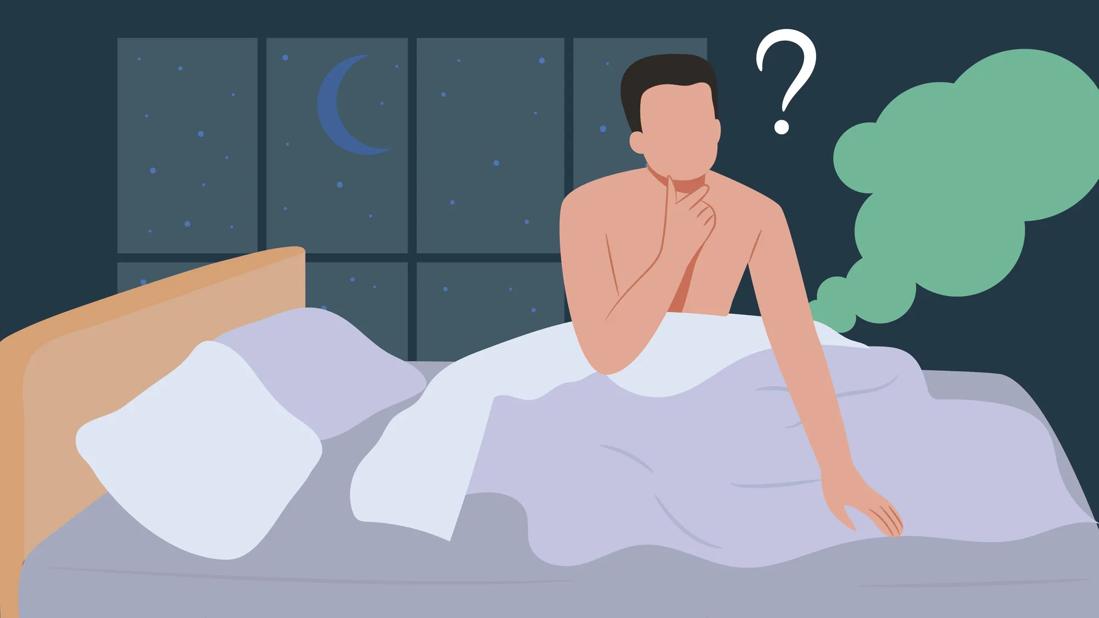What, when and how much you eat are just a few factors that can impact nighttime gas levels

Image content: This image is available to view online.
View image online (https://assets.clevelandclinic.org/transform/f700e4e5-5dce-4e7d-b4e1-e6b45c5de0cd/farting-at-night-1369224866)
Person sitting up in bed at night, with question mark above head and a green cloud of gas
Do you ever get the impression that your body’s internal horn section plays louder (and more often) at night? If so, you’re not alone. A lot of people fart more as the day wears on, and especially after falling asleep.
Advertisement
Cleveland Clinic is a non-profit academic medical center. Advertising on our site helps support our mission. We do not endorse non-Cleveland Clinic products or services. Policy
No one likes sleeping in a Dutch oven. But is it avoidable?
Gastroenterologist Michael Cline, DO, explains why having gas at night is normal, how to rein it in and when it’s time to see a doctor.
Passing gas is normal at any time — and it’s equally normal to feel like you fart more at night than you do during the day. Dr. Cline says it’s got a lot to do with your activity levels.
“You have gas throughout the day. But when you’re up, moving around and busy, it moves through your gut without you feeling it that much,” he explains. “When you’re relaxing or getting ready to fall asleep, you’re going to hear and feel it more.”
That fart you’ve got in the chamber is either a byproduct of aerophagia (swallowing air) or bacterial digestion.
We swallow air all the time, doing everything from talking to sucking on hard candies. And that air has to leave eventually. “If you don’t belch it back out, it’s going to come out the other direction,” Dr. Cline says. These farts tend not to smell.
You’re more likely to clear the room when digestion is causing your flatulence. Your gut uses bacteria to break down (ferment) everything you eat and drink — and it creates gases like hydrogen, carbon dioxide and methane in the process. When that process is slower — like when you’re lying down at night — the bacteria and gas have more time to build up. And by the time you’ve shuffled off to dreamland, that gas is shuffling out of you.
Advertisement
Being gassy at night is normal, but how much you have will vary based on factors like:
If you’re dealing with a straightforward case of twilight toots, you probably don’t need to see your provider. A few lifestyle adjustments will probably be enough to clear the air. Dr. Cline suggests that you:
Advertisement
We all have uncomfortable gassy nights from time to time. But having lots of chronic or painful gas could be a sign of an underlying health issue.
“Let your provider know if you’re bothered by excessive gas or bloating more than three days a week,” Dr. Cline advises.
He also recommends seeing a provider if you’re farting a lot and:
If any of these symptoms are severe, go to the emergency room. But if you’re just a person who farts a bit more than usual as the sun goes down? Well, take comfort in the knowledge that you’re not the only one having a not-so-silent night.
Advertisement

Sign up for our Health Essentials emails for expert guidance on nutrition, fitness, sleep, skin care and more.
Learn more about our editorial process.
Advertisement
Frequent burping can be many things — but likely not cancer
When it can’t pass down south, gas can definitely travel — and get trapped — up north
Fiber gets credit, but don’t let the byproduct keep you from enjoying beans
Excessive flatulence could indicate a digestive issue
Certain foods, medications or even illness could be behind the stink
Keto can reduce blood sugar, but that doesn’t mean it’s right for everyone
People with PKU need to avoid high-protein foods, like meat, dairy, legumes and whole grains
Although it could be used as a moisturizer, this new trend is not recommended
Communicating clear limits helps protect your time, energy and emotional well-being
High cholesterol can be genetic, but testing and treatment can lower your heart disease risk